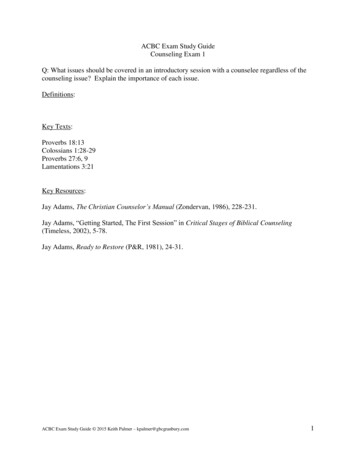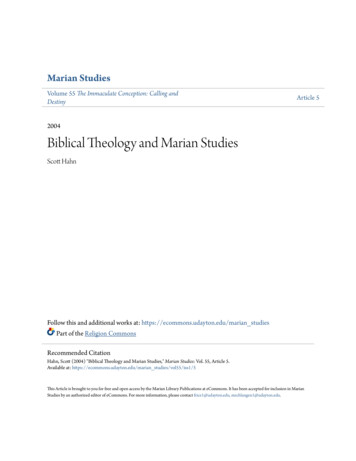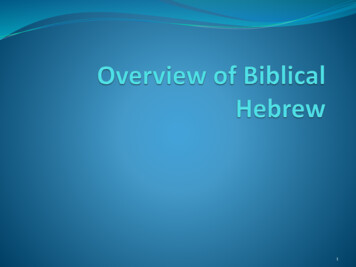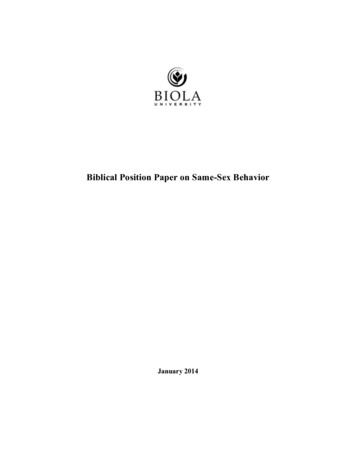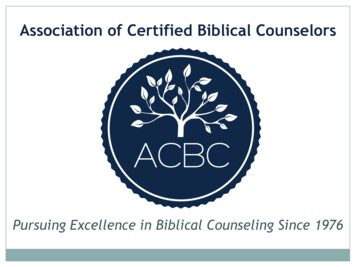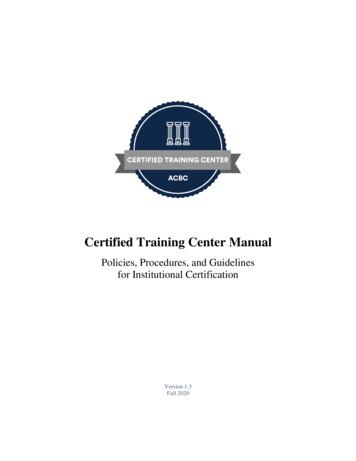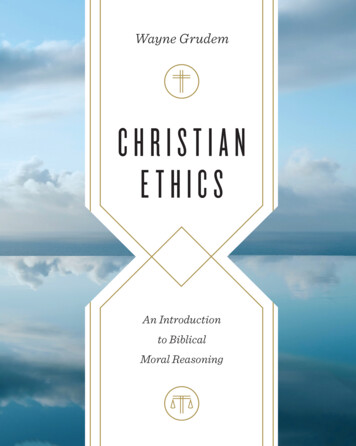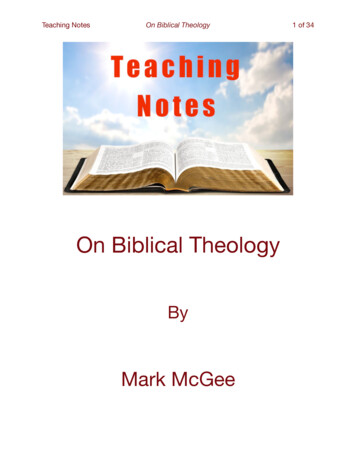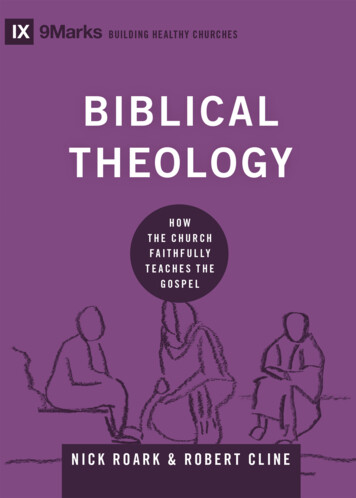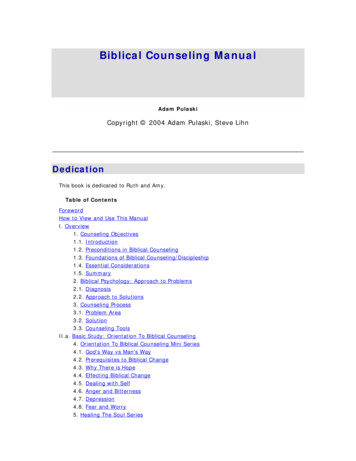
Transcription
GROLOVEFIVE BIBLICALIMAGES OFINCREASINGINTIMACYWITH GOD
How to use this bookLearning the meaning of a Bible passage is not enough to grow and mature us infaith. Christian maturity is much more than acquiring biblical information. Weneed to use this knowledge to become more and more like Christ in our loveand actions towards God and others. This is hard, but rewarding. Therefore, wewill need the help of other Christians to help us in our spiritual journey We need someone more mature to teach us, someone trustworthy to correctus, someone gentle to encourage us, and someone reliable to keep usaccountable. That is why we have designed this study to be used, either in yourone-on-one discipleship, or as a small group study. This book is a tool to helpyou journey in your walk with God, along with someone else as you study andapply the Word of God in your life.We hope that this resource will stimulate a lot of ‘interaction’ with the Bible,with your current thoughts and attitudes, and the practicality of living it out inyour own life.Each study contains four main components: The first section helps ‘break the ice’ and introduces the lesson throughthe sharing of personal thoughts on particular topics and experiences.The longest section is a study of Scripture. The aim is to understand themeaning of the passage(s) for its original audience, and then reflect onhow it speaks to us today.The “implication” section is a very important part of the study, so makesure there is ample time to go through it, as this helps in learning therelevance of the lesson by discussing how the passage applies to ourown time and situation.And lastly, we believe that our hard work of learning will not achieve thechange that we need unless God works in us. So make sure that you taketime to pray for one another.
Introduction“A picture is worth a thousand words.”So the saying goes. An image can convey far more meaning, far more quickly, farmore simply, powerfully, effectively, and far more memorably than could anylong-winded description.Perhaps that’s why Jesus often taught in parables.Word-pictures are unusually vivid verbal descriptions that not only illustratecomplex ideas, but can evoke powerful emotional responses too. God wants usto love Him with all our heart, soul, mind, and strength (Mark 12:30) – thereare things He wants us to understand (with our minds); there are things weshould feel deeply about (with our hearts); our thoughts and feelings then shapewhat kind of person we are (our soul), which then determines our actions andbehaviour (what we do with our strength).God has so much He wants to convey to us. So it’s no surprise that the MasterCommunicator would use word-pictures to help us to get the message. In thisfive-week (or five-session) study, we’ll explore five word pictures that God usesin the Bible to speak to us about our growing relationship with Him. We’ll lookat them in order of increasing intimacy: He is the Potter; we are the clay.He is the Shepherd; we are the sheep.He is the Master; we are the servant.He is the Father; we are the son.He is the Lover; we are the bride.Each word-picture tells us at least one thing about God’s character, and how weought then to respond. But don’t be surprised if you get much more than justone thing from each study. The imagery in Scripture is rich and powerful.
Please remember that even as we grow in intimacy with God, we do not simplyadvance from stage to stage (forgetting the last and moving on to the next).It’s more like we retain and build on what we’ve already learned, continuing topractice what we learned before, and expanding in our response to God.One last thing, you may find that your relationship with God doesn’t grow quiteso literally as described by these five word-pictures as laid out here. Yourjourney might not be so linear and sequential, but rather more of a back andforth, up and down, learn and re-learn experience. That’s okay you’reprobably like most people in this regard! Just continue to learn and grow,practice and live out.We’re sure you’ll find the next few weeks rich and rewarding. Because this Godthat we are learning to love through Jesus Christ, is so worth it.Prayer Before you even begin this Bible study, pray and ask God to teach you.Ask Him to open your mind to new ideas, to open your eyes to see newthings (or familiar things from a new perspective), to open your heart tobe moved.Ask the Holy Spirit to help you learn and grow, not merely in knowledge,but more importantly in the depth, vibrancy, and joy of your relationshipwith God.Ask the Lord to help you put into practice what He shows you.And pray the same for the others who are doing this study with you.
1Potter - ClayThen the word of the Lord came to me. He said, “Can I not do with you as this potter does?” declares the Lord. “Like clay in the hand of thepotter, so are you in my hand ”- Jeremiah 18:5-6“You turn things upside down, as if the potter were thought to be likethe clay! Shall what is formed say to the one who formed it, ‘You didnot make me’? Can the pot say to the potter, ‘You know nothing’?”- Isaiah 29:16Discuss1. What would you say is your best creation e.g. an invention, adrawing/painting, design, recipe, home renovation, etc.?2. When you were finished, how did you feel about your masterpiece?Our best creations are things that we are proud of because they reflect our hardwork, creativity, and personality; we invested something of ourselves. If ourcreation is then somehow ruined, it makes our heart ache. In this study we willsee how God’s special creation (mankind) and chosen people give Him thegreatest heartache.
Read Jeremiah 18:1-12The Potter Who Shapes Nations1. How do the nations of history (including Israel/Judah in this passage)compare to clay in the Lord’s hands as the potter?2. Look at vv.7-11. What does God expect of the nations that He raises up?What is He trying to form? What will happen if they don’t comply?3. The crux of a ‘marred pot’ is found in v.12 what might that look liketoday in our lives? Can you give specific examples?4. Is there any hope offered in the passage? Applying that to today, howdo you think we should respond to God, allowing Him to shape us“as it seemed best to him”?Read Isaiah 29:13-24; 45:1-13; 64:1-12The Potter Who Shapes People1. In 29:16, the clay says to the potter, “You didn’t make me” and“You know nothing” what does that mean? What kind of attitudesare reflected here towards God?
2. 29:13-15 gives some examples of how these bad attitudes are manifestin behaviour. Can you think of examples of how these same attitudesmanifest today?3. 29:22-24 paints a picture of what God is seeking to shape in us; whatkind of attitudes and behaviours are described or implied?4. In 45:1-13, Israel is upset because God announces He will use PersianKing Cyrus (a pagan!) as His instrument for delivering them from exile.In what ways do we, similarly, insist that God should do things our way,according to our expectations?5. God’s rebuke comes in 45:9-11. The sting is in v.11, “Do you questionme or give me orders?” Does this apply to us today? If so, how?6. 64:1-12 provides us with an example of how we too can and shouldrespond. What are some of the things that Isaiah models for us in hisprayer?
Implications1. Have you ever truly considered that God is not only Creator of theuniverse, but also that He is the Creator of you? That means you oweeverything to God – your personality, strengths and weaknesses,abilities and limitations, family circumstances, even your very existence.What do you think? How do you feel about that?2. If God is your Creator, then as a potter moulding the clay, He had apurpose in mind for you. He designed you accordingly and is still shapingyou towards that purpose. Do you have an idea of His purpose for yourlife? Have you asked Him? How could you go about finding out more?3. When you pray and feel disappointed that God isn’t answering, is itpossible that you may be asking for something that isn’t according toGod’s good, pleasing, and perfect plan for you? When you experiencefrustration or disappointment in your circumstances, perhaps you couldask God, “What are you trying to teach me, to form in me? How do youwant me to change, to be moulded and shaped as you will?”Prayer Acknowledge that God is the Creator – including of you – and as such Hehas divine right of ownership; that He has plans/purposes for your life.Thank God for the gift of free will, that He grants us freedom to choosefor ourselves in all kinds of things.Ask for His forgiveness where you may have acted like you knew betterthan God; perhaps even told Him or insisted on how He should do thingsyour way. Be humble and repent.Surrender to His sovereignty and wisdom. Ask the Holy Spirit to help youchoose obedience rather than independence. “Your will be done ”
2Shepherd - Sheep“The Lord is my Shepherd, I shall not be in want.” - Psalm 23:1“I myself will search for my sheep and look after them. As a shepherdlooks after his flock when he is with them, so will I look after my sheep.I will rescue them from all the places where they were scattered on aday of clouds and darkness.”- Ezekiel 34:11-12Discuss1. Do you have or have you previously owned a house pet? What was it?How was it treated and how loved was it? Share some of your bestmemories.The Scripture repeatedly bears witness to God as a shepherd and His people asHis sheep. But if we really think about it, this is an odd picture because it isbetween a human and an animal, an owner and his property. Therefore it isimportant for us not only to understand God as shepherd, but to ask a veryimportant question: What kind of shepherd? Not a lot of people would own asheep let alone have one as a pet, because sheep are usually kept as acommodity for economic gain. But, as we will see in this study, the picture theBible gives is one of intimacy and protection. God desires more than a product;He wants a relationship.Read Psalm 23:1-6Comforting Shepherd1. What would you say is the general message of Psalm 23:1-4?
2. How exactly does the Shepherd care for His sheep (vv.1-4)?3. How does the setting of verse 4 contrast with that of verses 1-3?4. Explain “he refreshes my soul. He guides me along the right paths for hisname’s sake” (v.3) in your own words.5. “I fear no evil” (v.4) is a bold statement. What does it mean for you tosay that?Psalm 23 gives us comforting assurance that God is our Shepherd who cares foreach individual sheep in the flock. This is the Shepherd who provides everythingthe flock needs, and therefore the sheep lack nothing. The Shepherd bringssecurity and protection. Even when the sheep walk through the darkest andmost frightening valley, the Shepherd is there for protection for He never leavesnor abandons. There is intimacy in God’s protection and provision for His sheep.Read Ezekiel 34:11-24Rescuing ShepherdEzekiel 34 is about the indictment of Israel’s kings who had served themselves atthe expense of their people. The beginning of chapter 34 (vv.1-10) gives us apicture of ruthless exploitation and self-interest of those who have been calledto lead God’s people. So now God is taking over from the disgraced humanleaders and restoring the true divine kingship.
1. Note all the times, in vv.11-16, that the first-person pronoun “I” appearsand the verbs that accompany each occurrence.2. What is the main problem with the nation of Israel in vv.11-13 and whatis God doing about it?3. Verses 17-19 speak against Israel’s leaders, who are abusing the people.Go back to verses 3-4. What is the main charge against these leaders?4. How is God as a shepherd going to respond to this crisis?5. Verse 23 speaks about the “one shepherd,” David, who will “tend” tothem and be “their shepherd.” But this is way past King David’s time. Wecan safely assume that this is a reference to the One True ShepherdJesus Christ, who said, "I am the good shepherd. The good shepherd laysdown his life for the sheep.”How is Jesus a fulfilment of the promises made in Ezekiel 34?
Implications1. Write about a fear you are struggling with (sickness, death,unemployment, relationship breakdown, etc.). How can the truths fromthis study help you fight your fears?2. Ezekiel 34 speaks against leaders of God’s people who failed to providequality or integrity of leadership; people who use and abuse the sheeprather serve and care for them. How are Christian ministry andleadership today susceptible to the same failure in Ezekiel’s time? Whatcan we do to make sure that we don’t abuse our roles in ministry?3. In Psalm 23 the psalmist refers to God as “my Shepherd” while inEzekiel 34 God refers to His people as “my sheep” (v.15, 31). How dothese phrases build your understanding and knowledge of God?4. Jesus is our Good Shepherd who laid down His life for the sheep. Howdoes the gospel bring comfort and assurance to your personal life?Share how the gospel has helped change your perspective in life.Prayer Give thanks to God that He is a shepherd that we can trust even duringour dark and difficult times.Thank God for the comfort that His Word brings and the promises thatwe can rely on.Praise our Good Shepherd who laid down His life for His sheep.Ask God to transform your life that you will be like the Good Shepherdto God’s people who are lost or weak.
3Master - Servant“No one can serve two masters. Either you will hate the one and love theother, or you will be devoted to the one and despise the other. Youcannot serve both God and money.”- Luke 16:13“Will (the Master) thank the servant because he did what he was told todo? So you also, when you have done everything you were told to do,should say, ‘We are unworthy servants; we have only done our duty.’”- Luke 17:9-10Discuss1. What kinds of modern relationships bear some resemblance to thebiblical King-Servant and Master-Servant/Master-Slave relationships?The Bible repeatedly reveals to us a God who is Lord and Master. From the OldTestament kingship (where the people were servants of the king while the kingwas a mere servant of Yahweh - the King over all) to the many parables of Jesus,God is shown to be a Master who requires obedience, rewards the faithful andpunishes the disobedient.Read Luke 17:7-10The Master’s Demands1. As a disciple of Jesus, what does it look like to be a servant of Godtoday? Some have suggested our service may lead to the danger ofexpecting God to honour the disciple. How does Jesus’ teaching rejectthat notion?
2. When we serve in the church, or in a ministry, we often expect somesort of acknowledgment. How do you feel when you hear Jesus’teaching in verse 10?3. How does Jesus regard service?4. What is the Master’s obligation to the servant?5. Whose will and choices are important in this parable?To better understand Jesus’ teachings, we should take into account the natureof a servant in Jesus’ time. In general neither Greeks nor Jews thought verymuch of their servants, and ‘service’ usually meant menial service to meet theneeds of the master. Jesus’ call to service and servanthood is all the moreremarkable against this background, and it is significant that he uses the imageof a servant to describe his idea of discipleship. The words of the centurion inMatt. 8:8-9 confirm this view of service at the time.Read Luke 12:35-48Two Very Different Servants1. What is the overall message of this passage?
2. In verse 42, what expectations does the master have of his servant whilehe is away?3. What does this parable tell us about how followers of Christ shouldrelate to each other?4. Compare the rewards for faithfulness (vv. 37 & 44) to the punishmentfor disobedience (vv. 46-48).5. What does this parable show us in regards to what God expects of us?6. What does this passage show me in regard to my relationship with God?Implications1. Can you claim to be a follower of Christ if you are ignoring some of Hiscommands?2. Luke 12:35-48 suggests that obedience to the Master involves lovingother followers of Christ, and that there will be severe judgment forthose who mistreat others. We are often quick to justify our behaviourwhen we hurt others . what would this parable say about such selfjustifications?
3. Conversely, sometimes we hold bitterness towards fellow-believers whohave hurt us; again we justify our unforgiveness. Knowing how theMaster expects us to treat fellow servants, how do you think Jesuswould respond to such behaviour and self-justification?4. In the light of the last question, is there someone to whom you need tomake amends or to reconcile with? If you can’t answer this questionopenly, don’t let this moment pass, but listen to the voice of God’s Spiritand act upon it.5. How could you use Jesus’ Master-Servant teachings to grow deeper inyour relationship with God?6. How can you serve God to faithfully reflect His character to this world?Prayer Pray to The Master that He will reveal His will for your life so you canserve Him with joy.Ask the Holy Spirit to reveal to you any areas of your heart that you havenot fully yielded to the Master’s will.Ask the Spirit to give you joy for the service you give Him, not for anyneed for recognition nor praise.
4Father - Son"'Our Father in heaven, hallowed be your name ”- Matthew 6:9Discuss1. What characteristics should a good father have? What are the things heshould be doing? Describe how a ‘good father’ relates to his child.The metaphor of God as Father could either give us a wonderful and comfortingpicture or a hard one to accept because of past hurts in our lives; some mighthave had an absent dad, an indifferent dad, or even an abusive dad. Therefore,the only way we can regain a proper understanding of God as a father, is tobegin with what scripture shows us. And, as we shall see, God’s desire is for usto know Him as a loving and generous Father.Father to the Israelites1. Throughout the Bible we find God portrayed as a Father. This portrayal,however, is surprisingly rare in the Old Testament, and is often used todescribe Israel’s relationship with God. Look through the passages belowand describe the Father-Son relationship of God and the Israelites.a. Deuteronomy 32:4-6b. Isaiah 64:8-9c. Psalm 103:13-14d. Jeremiah 3:19-20
For the Israelites to know God as Father was to know the One who created themand the One who would be compassionate and deliver them from their plight.However, because of the Israelites’ continuous disobedience and rejection, theylost access to the paternal intimacy that God wants to have. It was not untilJesus’ work that God was able to again be the Father He wantedto be.Father of Jesus1. The teaching of the Fatherhood of God in the Bible takes a decisive turnwith Jesus, for "Father" (Abba) was His favourite term for addressingGod. Look through the passages below and describe the Father-Sonrelationship between God and Jesus.a. Mark 1:11b. John 10:30c. Matthew 11:27Jesus' use of ‘Father’ as a designation for God involves the intimacy of the term.‘Abba’ was a term little children used when they addressed their fathers.2. Read John 5:18. How did the Jews respond to Jesus’ claim of divinesonship? Why do you think they reacted this way?Father to AllAddressing God as ‘Father’ was not just another way Jesus taught His disciples toaddress God; it was the way. He even taught them to pray in those terms,"Father, hallowed be your name" (Luke 11:2; cf. Matt. 6:9). But how can theIsraelites (or anyone) suddenly have this access and intimacy with God as aFather? Jesus tells us how.
1. Look through the passages below and describe what gives us access toaddress God the way Jesus did.a. John 14:6-7b. Ephesians 2:17-18c. Luke 11:13d. Romans 8:14-162. According to the passages below, what does it mean that we now haveaccess to God as ‘Our Father’?a. 1 John 5:14-15b. Matthew 7:11-14c. Hebrews 12:5-7d. John 14:2-3Unlike the Old Testament, the New Testament’s portrayal of God’s Fatherhoodis based not so much on God's role in creation but rather on the redemption andreconciliation He has made available in Jesus Christ by the Holy Spirit. This iswhy Paul refers to "the God and Father of our Lord Jesus Christ" (Rom 15:6;2 Cor. 1:3; 11:31). It is through the work of Christ that God invites us to call Him"Abba, Father." It is through Christ that grace and peace have resulted and wehave become God's children. This means that we have direct access to God’sincredible love, mercy and generosity and we are co-heirs with Christ for alleternity.
Implications1. In Romans 8:32 Paul says, “He who did not spare His own Son but gaveHim up for us all, how will He not also, along with Him, freely give us allthings?” What do you think Paul meant by “all things”? How do youthink this passage applies to your life today?2. Do you feel that you have a personal and intimate relationship with Godlike a child with his/her Father? If not, what do you think are somethings that are stopping you from having this kind of relationship? Howcould you grow and develop a closer relationship with God?3. The Son of God, Jesus Christ, came and entered our broken world sothat He could bring us to His Father. And before He died, the gospel ofJohn tells us that Jesus commanded His disciples, “As the Father has sentme, so also I am sending you” (John 20:21). Therefore we have the samemission as the Son. Is there anyone in your life (family, friends,colleagues, neighbours, etc.) that you could encourage towards arelationship with God? How could you go about doing this?Prayer Ask God to correct your wrong ideas of Him as a Father, and to renewyour mind and correct your thinking, so that you might delight in Hislove as much as He delights in you.Thank Jesus for bringing you to the Father through His sacrificial deathand ask Him to help you continually grow in intimacy with Him.Pray that God will give you the courage to share the Father’s love andthe humility to demonstrate the gospel through loving-kindness.
5Lover - Bride“For this reason a man will leave his father and mother and be unitedto his wife, and the two will become one flesh.” This is a profoundmystery – but I am talking about Christ and the church.- Ephesians 5:31-32Discuss1. Of all the human relationships we can experience, can you think of anythat are more intimate or powerfully emotive than the lover relationshipbetween husband and wife?2. If you have experienced such a deep relationship, what things broughtyou the most joy, and what brought the most anguish?In some ways, this is the hardest study to do in a short time, because there areso many references in both OT and NT describing our interaction with God beinglike that of a bride/wife to her husband. Here follows a very small selection. Butnote the depth of God’s desire and emotion in the best and the worst of timesthroughout the course of the love relationship.Read Ezekiel 16The Best and the Worst of Times1. Look at vv.3-14 that describe God’s courtship of and marriage to Israel.Obviously the language is metaphorical, but it conveys why God wouldfeel so strongly about His bride. Think back on your own journey withthe Lord; can you see how He has similarly courted you?
2. Verses 15-32 describe the relationship spiralling into anger and anguish.The language is very strong in describing Israel’s unfaithfulness, and howGod feels about it. Identify as many examples as you can of strong (evenshocking) language.3. There are few things more soul-destroying than unfaithfulness in amarriage. God's people have been adulterous, running after otherlovers. Thinking about your own relationship with God, are you able tounderstand God's heartbroken rage (vv.35-42), or identify with Israel'swaywardness?4. There is a measure of resolution in vv.59-63. But is it a good result? Or isit still not all that it could be or should be?Read Ephesians 5:21-33Christ and the Church1. Verse 31 says of a husband and wife, “the two will become one flesh.”Discuss the practical life implications when two become one?2. Paul concludes (v.32), “This is a profound mystery – but I am talkingabout Christ and the church.” What lessons can we draw about how tolove Jesus, from this passage, and from the husband/wife analogy?
Read Revelation 19:6-9; 21:1-10The Bride of Christ1. 19:6-9 depicts a scene in Heaven of “the wedding of the Lamb.” Who isthe Lamb/bridegroom (look back to Rev. 5:6-10)?Based on NT evidence (not just here) scholars agree that the bride is theChurch, consisting of every truly redeemed human being. What otherevidence in vv.8-9 supports this conclusion?2. In 21:2 and 21:9-10 the bride is called and described as “the newJerusalem.” But given that the rest of Scripture consistently speaks ofGod’s people as the bride, and that the apocalyptic style of Revelation isfilled with symbolic imagery, “the Holy City” here must be symbolic forthe people of God. According to v.3 and v.7, what characterizes thepeople of God?And who are those that will be excluded, who are not God’s people andtherefore will not be part of the Bride of Christ? (v.8)3. The good news of the gospel is that we are saved by grace. How is thisreflected in 21:6?4. Look again at 21:3-7 what are some things we can look forward towhen we’re finally joined to Christ, like bride and bridegroom? Howdoes this compare to Ezekiel 16:59-63?
Implications1. The husband and wife relationship is meant to be the closest, mostintimate relationship we can experience between human beings. When“two become one” it means they share everything: resources, plans, afuture, their very selves – body and soul. In marriage, we often have toset aside the wants of the individual for the greater good of the couple.There is now no-one and nothing more important than the spouse.Everything is wrapped up in and with the other person.It’s the same for Christ and His bride. He has already given everythingfor us, and continues to. Are we reciprocating? Have you sharedeverything with Him? Can you say to Jesus, “What’s mine is yours”? Doyou want to? What’s stopping you?2. In our ‘marriage’ to Christ – being united with Him – it is not an equalpartnership. He brings far more to the relationship than we do; we gainand benefit much more from Jesus, than He does from us. When Jesussays to us, “What’s mine is yours” list as many things as you can. Then,make a list of what you bring. Now, as you compare the two lists, does itstill seem like a huge sacrifice to give your whole self to Him?3. What God offers to us through Christ in the Lover-Bride relationship, wecannot earn or demand. It is all by His grace. It is His kindness, favour,mercy love! He is the Lover, we are the Bride of His choosing. Doesthis change your view of God in any way? How might you responddifferently towards the Lord Jesus from now on?Prayer Thank God for all He has given to you and for you; and for all that Hecontinues to offer. Thank God for His grace. Thank God that He lovesyou so much.Offer to Him everything you are and everything you have.Ask God to help you fall in love with Jesus (again). Ask the Holy Spirit tohelp you live each day as if you are the Bride of Christ; that no-one andnothing is more important to you than Jesus.
This Bible study small group resource was written and compiled by thepastoral team at Grace Church of Christ, Wantirna, Melbourne –Pastors Clem Fung, Raphael “RJ” Joson, and Tim Kerlin. Cover art: Our thanks to Jonah Iape. First edition printed, April 2017.
five-week (or five-session) study, well explore five word pictures that God uses in the Bible to speak to us about our growing relationship with Him. Well look at them in order of increasing intimacy: He is the Potter; we are the clay. He is the Shepherd
